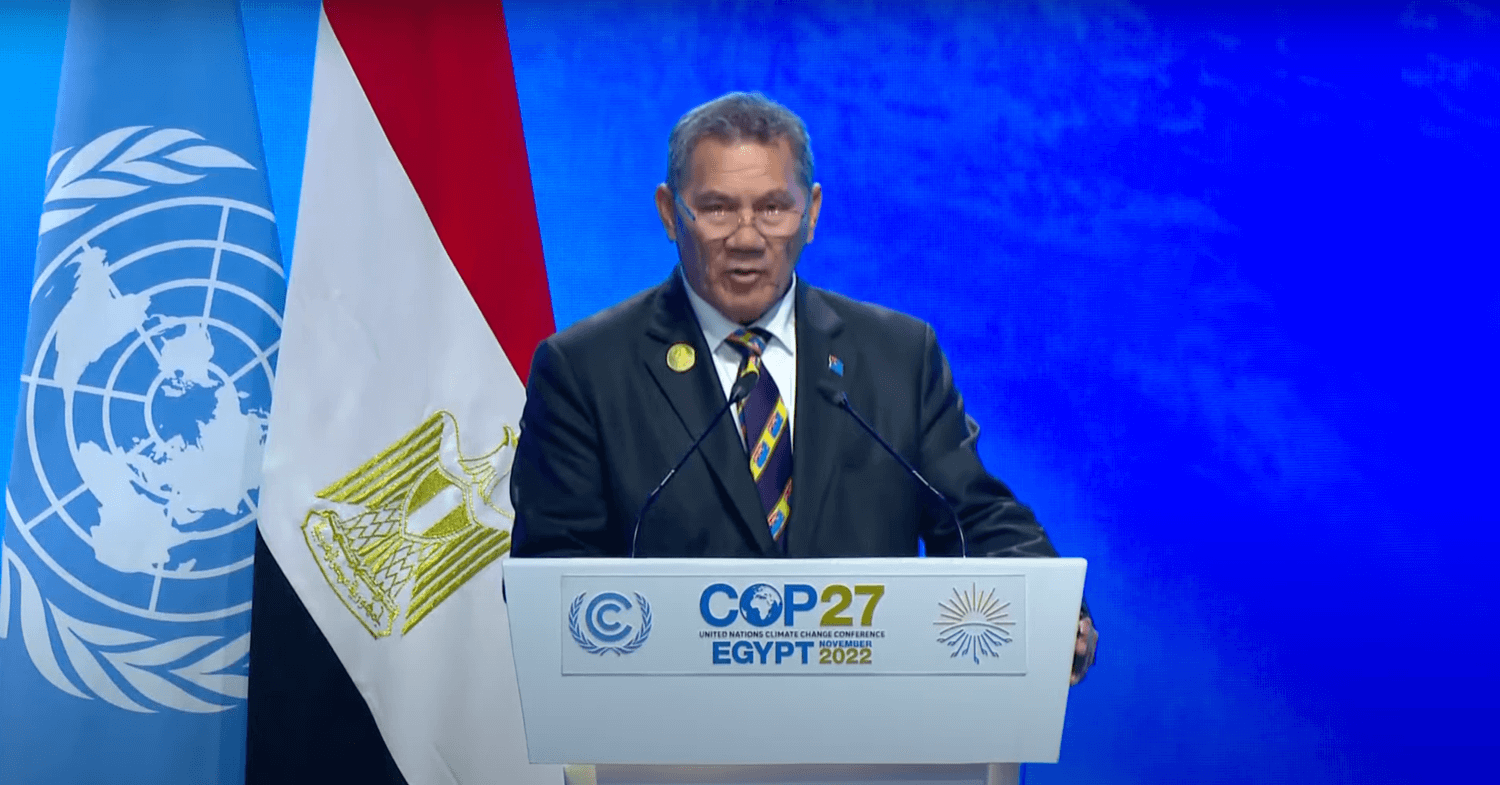Tuvalu has become the first country to use United Nations climate talks to demand an international fossil fuel non-proliferation treaty, which would phase out the use of coal, oil, and gas.
The small Pacific island nation, which is acutely vulnerable to sea level rises caused by global heating, becomes the second country to call for an agreement to end the era of burning fossil fuels, which is the primary cause of the rapidly escalating climate crisis, fellow Pacific nation Vanuatu being the first.
Tuvalu made the call on Tuesday at the COP27 climate talks in Egypt. Climate activists have welcomed the move but condemned large polluters, such as the US and China, for ensuring that fossil fuels have largely been shielded by previous iterations of the climate talks.
Kausea Natano, the prime minister of Tuvalu, said that “the warming seas are starting to swallow our lands, inch by inch. But the world’s addiction to oil, gas and coal can’t sink our dreams under the waves.
“We, therefore, unite with a hundred Nobel peace prize laureates and thousands of scientists worldwide and urge world leaders to join the fossil fuel non-proliferation treaty to manage a just transition away from fossil fuels.”
“Countries like Tuvalu are the ones on the frontlines, they know they can’t just give in to the vested interests of the fossil fuel companies,” said Harjeet Singh, head of global political strategy at Climate Action Network International. “We know who the victims of the climate crisis are and we know who the perpetrators are but we don’t ever discuss fossil fuels, the elephant in the room.”
Singh said a fossil fuel treaty that would curb new exploitation of reserves and switch in a just way to renewables has so far been overlooked “by design” because of the reliance of several powerful countries on digging up and burning fossil fuels.
Countries pledge loss and damage assistance
New Zealand joins a small group of wealthy countries to help fund developing nations facing losses and damages caused by climate change, with an initial pledge of NZ$20 million (US$11.9 million).
Overnight, Germany made the largest commitment so far of US$300m, Austria US$50 million, while Belgium announced just over US$4m. Scotland has also upped its contribution to nearly US$14m while Denmark committed US$22m earlier this year.
It is estimated climate change impacts have cost developing countries more than US$800 billion in the past two decades and could rise to between US$500b and US$1 trillion a year by 2030.
New Zealand Climate Change Minister James Shaw said negotiations (on loss and damage) had been “frustratingly slow”, held up by arguments around responsibility for climate impacts and liability.
Shaw, who travels to Egypt for COP27 on Friday, said this announcement was not admitting liability, though he accepted it was “obvious” where responsibility lay.
“Comparatively wealthy countries like Aotearoa New Zealand have a duty to support countries most at risk from climate change.
“We know that there are costs associated with loss and damage, we’re going to start contributing to that, even in the absence of a global agreement,” Minister Shaw said.
Lavetanalagi Seru, Regional Policy Coordinator for the Pacific Islands Climate Action Network says the announcement by NZ “sends a strong signal” to Pacific small island states, who are already living through an era of loss and damage. “However, this funding announcement—similar to Scotland, Belgium, and Denmark—whilst welcomed and a pivot towards getting the process off the ground, is still only a drop in the ocean.”
Joseph Sikulu, Pacific Regional Director at 350.org, says “Pacific representatives are fatigued in climate negotiations as we see empty promises and unfulfilled pledges. Global North countries have a responsibility to ensure that loss and damage funding is not only sufficient, but also accessible to those who need it most.”
Grants for Pacific Coastal Communities
Meanwhile, international funding agencies at COP27 have partnered to provide US$16.5 million in grants towards ADB’s Blue Pacific Finance Hub, which aims to build ocean and coastal resilience in countries threatened by the impacts of climate change.
The GEF-Least Developed Countries Fund is providing $10 million and Asian Development Bank US$2.5 million, with Nordic Development Fund also providing a proposed commitment of US$4 million.
“Oceans are a lifeline for ADB’s Pacific developing member countries,” said ADB Vice-President for East Asia, Southeast Asia, and the Pacific Ahmed M. Saeed. “We are grateful to our partners for their contributions and look forward to working with them closely to support the Pacific’s blue economies.”
Marshall Islands Climate Envoy Tina Stege welcomed the announcement: “Marshallese identity and culture are inextricably tied to the oceans. Our economic activities are also closely tied to the sea and marine resources. We must find ways to adapt to the impacts of climate change that threaten our way of life, while also exploring opportunities to develop and strengthen our ocean economies. Grant-based finance and technical support will be key to our efforts.”
ADB says the BPF Hub will particularly help women and communities by funding coastal adaptation initiatives.
